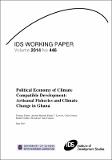Political Economy of Climate Compatible Development: Artisanal Fisheries and Climate Change in Ghana

Download
Date
2014-06-30Author
Tanner, Thomas
Mensah, Adelina
Lawson, Elaine T.
Gordon, Chris
Godfrey-Wood, Rachel
Cannon, Terry
Metadata
Show full item recordImpact
Abstract
Interest in prospects for policy processes that contribute to development, climate change adaptation and mitigation, known as ‘climate compatible development’, has been growing in response to increasing awareness of the impacts of climate change. This paper provides insight into the complex political economy of climate compatible development in Ghana’s marine fisheries, a sector that has received comparatively little attention in climate change literature and policy processes. It focuses on two contentious policy areas where there is potential for climate compatible development, namely the subsidized premix fuel provided to artisanal fishermen, and mangrove protection. Regarding the premix subsidy, while there is theoretical scope for a ‘triple win’ outcome by removing the subsidy to reduce incentives to unsustainable fishing and supporting alternative policies, in practice this is highly problematic. Artisanal fishermen strongly oppose removing the subsidy on the grounds that it would damage their livelihoods, and do not have the confidence that they would be appropriately compensated for any hypothetical reform. Moreover, it is argued that removing it could have negative unintended consequences if fishermen are forced into alternative livelihoods that are themselves unsustainable. There is, however, a need to make considerable improvements to the distribution of the premix fuel so that it reaches the intended beneficiaries and is not siphoned off for contraband. Meanwhile, although improved mangrove protection could have significant ‘triple-win’ benefits, this area suffers from a lack of funding and administrative coordination across ministries and agencies, leading it to be neglected. The case studies reveal, therefore, that the major constraint to climate compatible development is institutional failing, rather than a lack of policies per se. The paper emphasizes the need to conceptualize climate compatible development as a process which is dynamic across space and time, such that potential for triple win outcomes is fluctuate to vary according to changing circumstances. It is necessary to recognize, furthermore, that pressures from a number of actors, including those at the grass roots, may demand short term improvements to current problems rather than aspiring to triple win outcomes in the long term, creating a major challenge for climate compatible development.
Is part of series
IDS Working Paper;446Rights holder
Institute of Development StudiesCollections
- IDS Research [1662]
